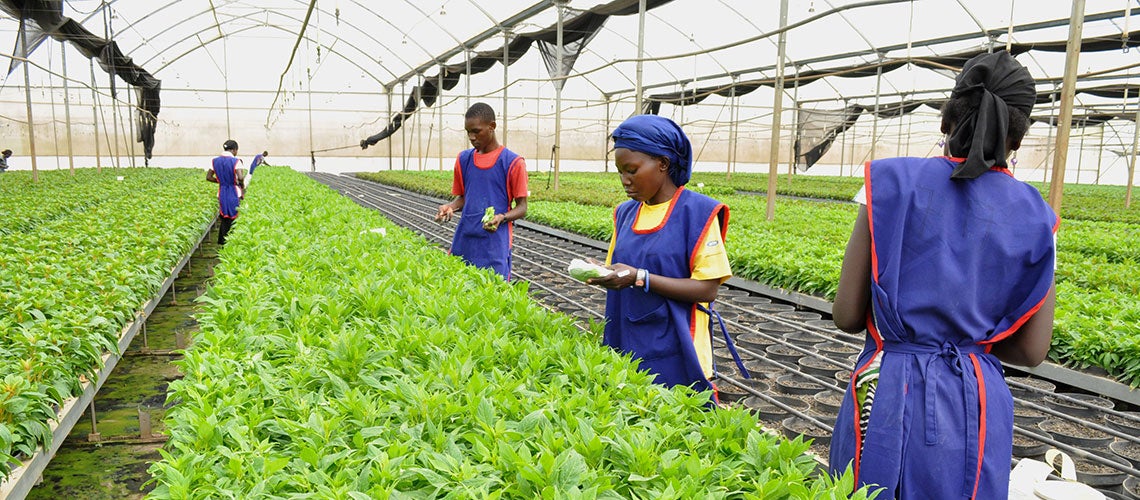 Tree seedlings. Photo: Rachel Mabala
Tree seedlings. Photo: Rachel Mabala
On the road to COP26 in Glasgow, the calls for more locally led climate action are growing stronger. While evidence on the value of local and community-based adaptation and disaster risk management has been building over decades, global and national policies to channel climate finance and decision- making power to scale up these approaches has not kept pace. Kenya is changing that, with the unveiling of the Financing Locally Led Climate Action (FLLoCA) Program.
Developed with support from the World Bank, and from the Governments of Denmark and Sweden, this new program establishes the first national-scale model of devolved climate finance and supports the Government of Kenya to translate its ambitious climate agenda into scaled-up action on the ground. The program recognizes that locally led adaptation can be more effective than top-down interventions, as local communities are more aware of the context and what is needed to drive change. It applies principles of meaningful citizen engagement in climate decision making and builds on the foundations and structures set up through Kenya’s devolution efforts.
Ninety percent of program funding from FLLoCA will be spent at county and community levels to ensure that support for climate resilience reaches those most at risk, including women, youth, persons with disabilities, elders, and other traditionally marginalized groups. Delivering 100% climate co-benefits, this program supports partnerships between local governments and their citizens to assess climate risks and identify socially inclusive solutions tailored to local needs. With communities across Kenya also dealing with the impacts of the COVID-19 pandemic, FLLoCA takes a broad view of resilience and recognizes that communities are aware and experienced in managing multiple risks simultaneously. For example, investments may focus on activities that support livelihood diversification, or community-level preparedness for multiple risks. Depending on what communities prioritize, investments may also promote water conservation and more efficient use of water, support natural resource management, rehabilitate degraded lands, or promote early warning systems.
The program builds on the Kenya Accountable Devolution Program, a pilot program funded by the World Bank, in addition to County Climate Change Funds (CCCF) piloted by the Adaptation (ADA) Consortium. The CCCF pilots financed around 100 public good investments that were prioritized by the communities through a highly consultative process, reaching more than 500,000 beneficiaries across the five counties (Isiolo, Garissa, Kitui, Makueni and Wajir), most of whom were women. Investments included the rehabilitation of bore holes and installation of solar equipment; water harvesting, storage, and distribution systems; sanitation facilities; and governance activities, among others. A large-scale household survey conducted in 2018 found that the investments resulted in 100 percent greater access to water for households and livestock. A follow-up assessment of the program in 2019 found that the investments had additional direct and indirect benefits, including improved livelihoods, incomes, and food security, new economic opportunities, and fewer conflicts within households, communities, and between neighboring villages. Overall, it was found that the pilots led to significant adaptation benefits for households and communities, while also strengthening county institutions, and improving the responsiveness to local needs, including of vulnerable and marginalized groups.
The success of these pilots generated demand from other counties, and support from Kenya’s National Treasury to scale up this approach and make it available to all 47 counties, resulting in this new nationally scaled program.
The approach of FLLoCA to prioritize citizen engagement and local leadership in climate action also aligns with the Principles for Locally Led Adaptation developed by the Global Commission on Adaptation. The principles include the need to address structural inequalities that drive climate vulnerability for marginalized groups, including women, youth, Indigenous Peoples, persons with disabilities, displaced groups, and ethnic minorities; investing in the capacity of local institutions and multisectoral collaboration; ensuring flexible programming and learning; and the integration of scientific and indigenous knowledge for adaptive management.
By engaging communities in understanding how global climate trends are affecting them locally, facilitating partnerships and collaboration to address climate challenges, and strengthening demand and transparency of climate action, FLLoCA aims to build a movement for climate action in Kenya.
As the program gets underway, lessons will be shared widely as they emerge so the movement for large-scale support to locally led climate action can spread to other countries as well.
Related:



Join the Conversation